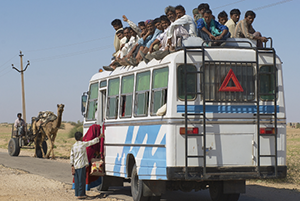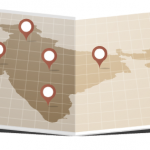I did not see policemen, traffic signs or stop lights. The only thing that seems to regulate the traffic are the omnipresent cows, which meander across the road, this way and that way, at whatever speed they choose. Cows are sacred, and motorists respect this status, with this religious observance slowing traffic often to standstill, moderating what could otherwise be a raging torrent of vehicles. The cows in India look thin, even emaciated, but such may be the normal state of bovine affairs. Like their human counterparts, cows in America most likely have the metabolic syndrome from an overabundance of corn in the feed lots that boosts their fat to provide the unique taste of seared marbled meat so beloved in America.
Alas, cows do not suffice for traffic control, and at night, the roads are carnage. I personally did not see an accident, a situation that mystified my postdoctoral fellow from Mumbai who said he saw one almost every day on the way to his university. Although I did see a dead cow on the roadside, a victim of a hit-and-run, road accidents in India occur with incredible regularity, inflicting an extraordinary toll of death and injury, which can dwarf in size and impact that of any musculoskeletal disease in the Western world.
My American Safety Solution
Like most Americans, however, I am an optimist who thinks simplistically and would imagine that traffic control does not need much scientific inquiry. Rather, it should be amenable to approaches that have seemingly worked well in our country (bearing in mind that we still have terrible problems with drunk driving).
I would, of course, start with safer vehicles, replacing the two-wheelers with big four-wheelers with plenty of steel, like our safety-rated models with ABS brakes, air bags and electronic wizardry to alert the driver to avoid hazards.
I can only imagine what would happen in India with the neat device on a Mercedes that beeps when the car veers into another lane. It would sound nonstop and probably blow up from an overheated circuitry.

Passengers crowd a bus in Jamba, India. Public transportation in the Great Thar desert, Rajasthan, is usually overloaded.
Dmitry chulov/shutterstock.com
The better vehicle solution seems out. People in poor countries use animals and two-wheelers for conveyance because they are poor and cannot afford anything bigger, better or safer. A modern car would take a lifetime of earnings to purchase, even with no money down and 0% financing. Even with affordable cars, however, the price of fuel would be excessive and can only rise as the world competes for dwindling supplies. With more cars on the road, pollution—air and noise—would be magnified, and levels of carbon dioxide would rise even faster than they are now—and that is already alarming. If nothing else, bicycles do not produce carbon dioxide.
